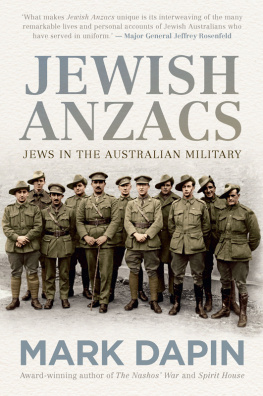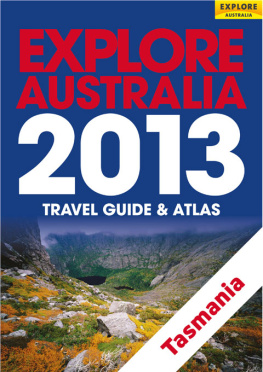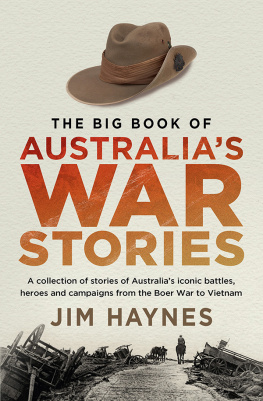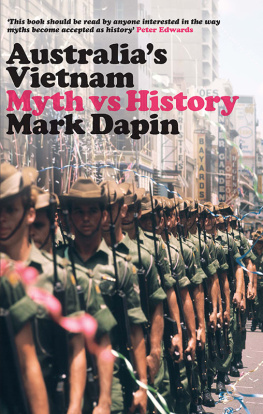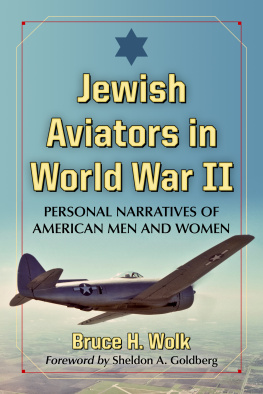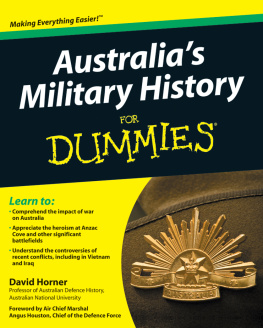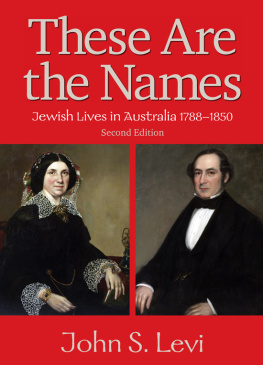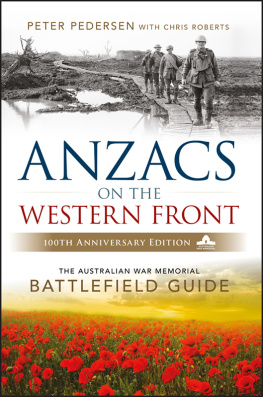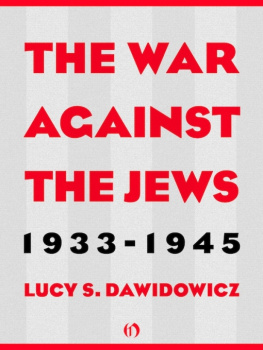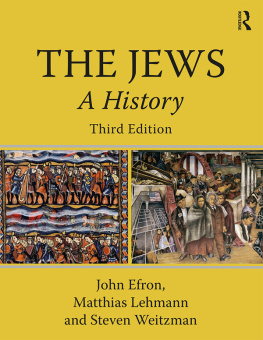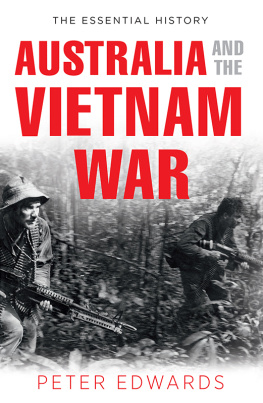
MARK DAPIN was born in Leeds, England, in 1963. His family are of Ashkenazi and Sephardi Jewish descent. He grew up in Aldershot, home of the British Army, where the only other Jews were in the cemetery. His great-grandfather was in the British Army at the time of the Boer War. His grandfather was an air raid warden in the East End of London during the Blitz in World War Two. His father was a British Army national serviceman in the 1950s. Marks 2010 novel Spirit House, about Jewish POWs on the Burma Railway, was shortlisted for the Age Book of the Year and the Royal Society for Literatures Ondaatje Prize, and longlisted for the Miles Franklin Literary Award. His first military history, The Nashos War, about the Australian national service scheme and Vietnam, won an Alex Buzo Shortlist Prize and the Peoples Choice Prize at the Waverley Library Awards for Literature (The Nib), and was shortlisted for the NSW Premiers Award for Non-Fiction. Mark is a PhD candidate in Military History at UNSW Canberra.

A NewSouth book
Published by
NewSouth Publishing
University of New South Wales Press Ltd
University of New South Wales
Sydney NSW 2052
AUSTRALIA
newsouthpublishing.com
Sydney Jewish Museum 2017
First published 2017
10 9 8 7 6 5 4 3 2 1
This book is copyright. Apart from any fair dealing for the purpose of private study, research, criticism or review, as permitted under the Copyright Act, no part of this book may be reproduced by any process without written permission. Inquiries should be addressed to the publisher.
National Library of Australia
Cataloguing-in-Publication entry
Creator: Dapin, Mark, author.
Title: Jewish Anzacs: Jews in the Australian military / Mark Dapin.
ISBN: 9781742235356 (hardback)
9781742242705 (ebook)
9781742248189 (ePDF)
Notes: Includes index.
Subjects: Australia Armed Forces Minorities History.
Jewish soldiers Australia.
Jewish Australians Wars.
Design Josephine Pajor-Markus
Cover design Blue Cork
Cover images FRONT Meeting of Australian Jewish soldiers outside the YMCAs Jewish Soldiers Hut, London, after World War One. Australian War Memorial, H01295; colourised by Luke Causby. BACK Clockwise from centre: Jake Kleinman; Walter Karri Davies; Berrol Mendelsohn; Edna Goulston; Wilfred Beaver; Sol Levitus; Philip Allen. See picture sections and picture credits list for details.
Printed in China
All reasonable efforts were taken to obtain permission to use copyright material reproduced in this book, but in some cases copyright could not be traced. The author welcomes information in this regard.
This book is printed on paper using fibre supplied from plantation or sustainably managed forests.
This project was assisted by funding from the Commonwealth Governments Saluting Their Service Commemorative Grant program.

Foreword
by Major General Jeffrey V Rosenfeld
The 201418 Centenary of Anzac Commemorations include anniversaries of the Anzac landings at Gallipoli, the other battles of World War One, as well as significant anniversaries of World War Two and subsequent wars. Many Australians have become aware of those transformative events in Australias history for the first time and many young Australians have learnt about the sacrifice of fellow Australians of similar age who went to war many years before they themselves were born. Those who visit the war graves at Gallipoli and on the Western Front are often brought to tears.
The Australian Jewish community should be incredibly proud of the Jews who have made such an extraordinary contribution to the defence of Australia and our allies, particularly when one considers the relatively small size of the Jewish community. Following more than 2000 years of persecution, Jews have an abiding respect for human rights and a deep appreciation of the fragile nature of freedom and democracy. I believe this is essentially why so many Jewish Australians have taken up arms. By the end of World War Two, more than 7000 Australian Jews had served in the defence of Australia, with thousands more serving in the Australian Defence Force (ADF) subsequently. At least 340 have made the supreme sacrifice: they are honoured with details of their final resting place or memorial in the Appendixes to this book.
Remembrance (Zachor in Hebrew) is a central tenet of Judaism. It is the solemn duty of the Federal Association of Jewish Ex-Servicemen and Women (FAJEX) and its state affiliate organisations to remember and pay our respects to those Jewish Australians who have served Australia and its allies in times of war and particularly to commemorate those who lost their lives. This duty includes raising awareness in the community, and educating the current and following generations about the courage and sacrifice of Australian Jews who have served in the ADF.
I believe Jewish Anzacs will become the definitive account of Australian Jews at war and peacekeeping for many years to come and will thus help to perpetuate the memory of those who have served. Equally, any lingering doubt about the loyalty of Australian Jews to Australia and the Crown is dispelled in these pages. Australian Jews have had the same hopes, dreams, and a desire to fight for freedom and the creation of modern Australia as have non-Jews.
Mark Dapin presents a succinct history of each of the conflicts, wars and operations in which Australia has taken part from the nineteenth century to the present day. However, what makes Jewish Anzacs unique is his interweaving of the many remarkable lives and personal accounts of Jewish Australians both passed and still living who have served in uniform: from all three services, wearing many different ranks from diggers to generals, and in diverse occupations. Their experiences reflect and supplement those of all our Australian servicemen and women.
The stories of three Jewish soldiers who were recommended for the Victoria Cross, the highest military honour For Valour are no less extraordinary than the stories of all other VC recipients. During the Boer War, West Australian Walter Karri Davies humbly declined a VC for his outstanding bravery at the Relief of Ladysmith. Issy Smith sailed back to England from Melbourne at the outbreak of the Great War to rejoin his old Manchester Regiment. He was awarded a VC for rescuing wounded comrades from No Mans Land during the Second Battle of Ypres on 26 April 1915, the day after the Anzacs had landed at Gallipoli. There, Leonard Keysors daring actions, throwing back Turkish bombs at the Battle of Lone Pine in August 1915, resulted in his award of a VC.
While several excellent biographies of General Sir John Monash have been published, Mark Dapin accords General Monash the special attention he deserves. He is indisputably one of Australias greatest sons. It is often stated that his exceptional leadership of the Australian and allied troops to victory on the Western Front and his pride and openness in being Jewish were the reasons anti-Semitism was limited in Australian society at that time and well beyond.
Mark Dapin has uncovered the stories of many more World War Two servicemen and women, bringing back to life dozens of characters: from the amazing exploits of Group Captain Julius Cohen in North Africa and the leadership of Lieutenant Colonel Paul Cullen there and in New Guinea, to the humorous experiences of private soldiers and the terrible privations of prisoners of war in Europe and Asia.
Next page
